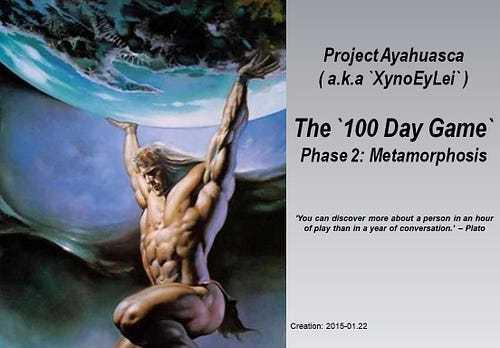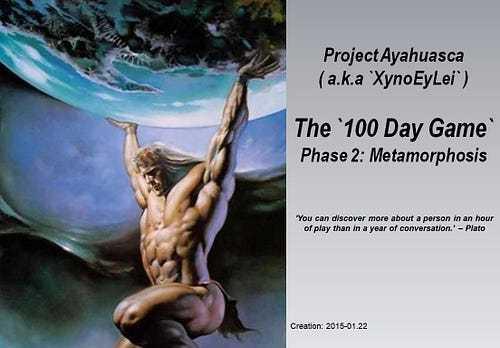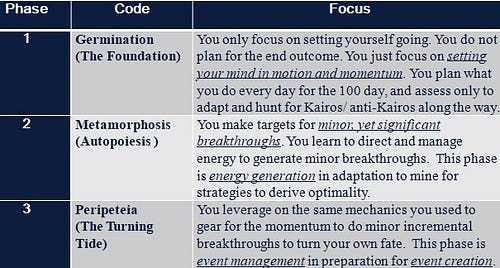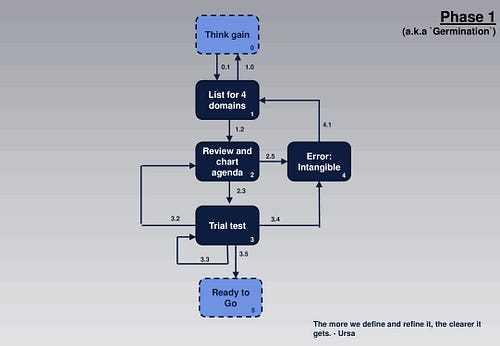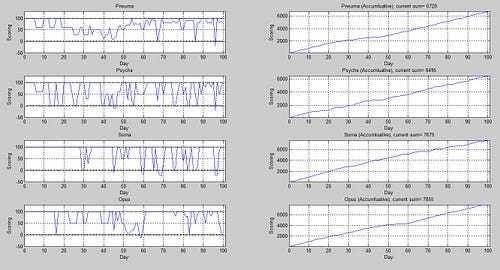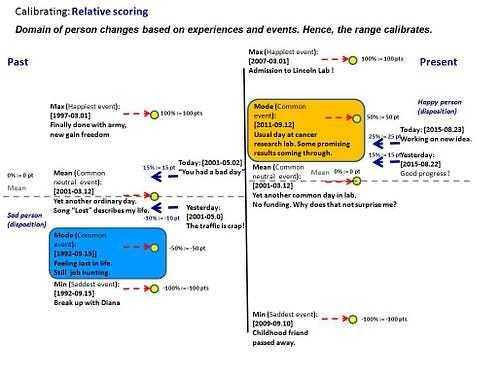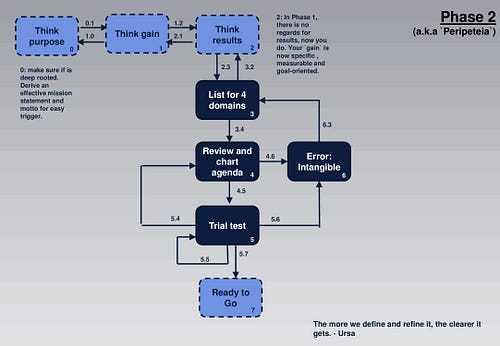Explore the World's Best Ideas
Join today and uncover 100+ curated journeys from 50+ topics. Unlock access to our mobile app with extensive features.
Situations Reveal you
Situations, even the simulated games, reveal ourselves to us, and also aid us to arrive at ideas, answers, and insights we would not have likely arrived at without them. Hence, the fastest way to learn and evolve is to create them.
Life is a game. I created one within the other to deal with it.
46
290 reads
Phase 1 : Key Notes
- Phase 1 (`Germination `) sets the ground.
- The subject is able to engage the system, and use it to mind and mine for methods to be deployed to make changes to his/her life.
- It helps the subject to understand him/herself and, thereby, learn to make the adjustment. It sets the momentum for change.
- It does not aim to have the grand effect that most people are hoping for, it sets the framework and foundation for the mind to use the framework.
- Change does not happen overnight, but when the game is over, the subjects will realize they have way gone pass their starting status quo — 100 Days after.
46
120 reads
Phase 2: Metamorphosis
- Phase 2 is designed with the requirement for using the mechanisms and methodologies the subjects found in Phase 1 to repeatedly transcend their old self.
- In days to come, they will go beyond their old limits. This will be discussed in the next article where we will see that Phase 2 comes with the end goals in mind.
- Each goal targets the delta(s) of what they cannot do before the start of the game.
44
105 reads
It should not hurt
It might break someone trying to go beyond his limits everyday, but it shouldn’t hurt to touch that limit and check for that time to cross it eventually on a daily basis.
44
209 reads
Momentum is not enough
- Phase 1, Phase 2, and Phase 3 follow part of the principle of `Control your mind, Control your situation`.
- In Phase 1, the subject begins to grasp the principle to contain his mind, the system puts the control gradually back to the subject.
- However, in order to wrest back the focus and controls, s/he needs to go beyond the momentum gained in Phase 1.
43
69 reads
By the very fact that you are having the awareness that you are focusing, tells you that you are in command and control; and, importantly, that you are very much alive. It may not promise you the direction, but you are moving forward. You just need to understand the possibility landscape of the terrain to chart and navigate your destiny.
— MI’KAIL ELI’YAH TO SUBJECT CODENAMED `E`
44
75 reads
Objective:100 Day Game
- You would have realized by now, the `100 Day Game` was designed to tool for self-discovery and enhancement.
- As you continue to “Adapt, Improvise, and Overcome ”, you will evolve your methods further.
- The controls of the conditioning should already be set in your hands.
44
119 reads
Phase 2 Eligibility
- In order to pass Phase 1, it is recommended that you gain 75% of the total score.
- Above 50% may be acceptable, however the further you are away from the 100% mark, it is likely that you will face the difficulties in Phase 2.
Passing Phase 1 means:
1. You have worked according to plans
2. You should have found some enhancements and removed some barriers. Which means, you have understood yourself better as compared to Day `0` before starting Phase 1. You would be capable for introspection.
3. You acted according to plan and is able to focus and follow through under the Ulysses’ pact.
43
44 reads
Tips
The race is not to the swift nor the battle to the strong. Do not hesitate to do a few rounds of conditioning as a drill set to prepare for Phase 2. This is also part of the survival guideline for Phase 2.
47
368 reads
Phase 2 Scoring
- In Phase 2, the scoring is graded by relative calibration .
- The reason is because the human mind itself is subjective and relative to themselves. One person’s 100% is not the same as another’s.
- The second reason is because the human perception is also relative to the situation and scenario at hand, i.e., the happiest event and the most sorrowful event is not the same in different parts of our life.
- It is also dissimilar based on the context and other events happening on that same day.
- The third reason is due to that the human memory is not as extensive as we would like to be confident with. It remembers the first, last, most significant events and memory based on recency, i.e. the events that are most recent.
Note: 50% is the normalized functional level. 0 to 50% may signal lower energy that does not meet the requirement to accomplish certain tasks or function properly. Negative is the abrasion state where if persisting will cause the subject to be on the downhill.
44
29 reads
Relative Calibration
- Recency (time-based) : The human memory working is limited — very limited. However, the more recent the event is, the more the clarity. Hence, the very next thing the human can reference to is — the most recent event.
- Referential (event-based) : The mind requires significance and significant references. The more events you have reference or relate to, the more, the clarity of why and how you are feeling and behaving in a certain way can be explained. It also draws the boundary of your limits and significance your focus will be captured by, especially, the things that you value and/ or like / dislike. Hence, effectively, you are building a framework to describe your mental terrain.
- Relative (event-based) : The human perception is easily distorted, but it is relatable. The more referential points you have to relate to, the easier you can relate and anchor on to estimate where you may position your current state of mood / mind.
The significant references to how the scoring is determined are recency , frequency , intensity and effect .
44
21 reads
Relative Calibration Example
- Subject’s dimension of emotions has expanded, and his/her mean has shifted.
- The granularity and the definitions of each grate of his/her emotionality has also been redefined in his/her mental terrain.
- Hence, we contend that the common `1 to 10` medical scoring with no referential framework is meaningless.
- It will only become meaningful when it is mapped to a context, and calibrated to a person’s state transitions throughout his/her life, and the more data we have, the widen the context, the more meaningful information we can obtain from the scores to conduct analysis , and to design interventions as part of the solution synthesis . Any solution requires these 2 parts.
43
19 reads
How to play phase 2?
- For Phase 2, the objective is to design and learn to plan for overcoming personal limitations.
- The subject is required to conduct vigilant assessments, set the requirements and map the working criteria to requirements.
- Hence, s/he is required to detect personal lack, identify possible improvement approaches and provisions, and strategize contingencies to mitigate if not fully overcoming them.
It is critical to plan very carefully before starting the game. One must identify the targets (outcomes to be achieved), forecast the problems faced, set the countermeasures, contingencies (a.k.a back-up plans), and determine what is the desirable criteria to know that the requirements are met.
- For example, a target may identified as to overcome his/her shyness, and the outcome may be a challenge to be able to gain the confidence to do street magic — something that the subject has never done before.
43
28 reads
Extra tips
- It is important to understand why you are doing it, as well as how you would be able to reach the target. State the motive, motivation, significance and opportunities that achieving them will bring.
- The target has to be possible, yet difficult, with certain risk of failure, but surmountable, and qualifiable as a life-time record to-date that was never achieved.
- The target, is thence, termed as a delta , i.e. something one had never been able to do before, and requires work to achieve a certain effect, and after the fact of Phase 2, s/he would be able to accomplish it.
- Phase 2’s little idea is to use micro-feats as evidence for transformative leverages on the individual.
- Once the subject gets the methodology, s/he will be able to use it to conduct a series of similar transformative projects into a scheme to mine for methods. This hints the next phase, Phase 3, `Metamorphosis`.
45
31 reads
Note
- It is recommended that the subject drill through them before starting the game, and re-calibrate how s/he will manage the game.
- The central idea is to learn life management. Once s/he starts the game, s/he can only adjust to the storm.
- Hence, the war-gaming trial before the actual game gives an insight how the subject may fare. The central rule is `plan the test, test the plan`.
45
103 reads
Phase 1 vs 2
- The difference between Phase 1 and Phase 2 is in Phase 1, you only focus on setting yourself going.
- You plan what you do every day for the 100 days, and assess only to adapt and hunt for Kairos/ anti-Kairos.
- For Phase 2, you make targets for minor, yet significant breakthroughs .
43
31 reads
Tips (Zeigarnik effect)
- Logging the scores and monitoring the journals are key to the game.
- In Phase 2, the subject should also induce a sense of proactive curiosity — with just 1 more baby step every time,
- i.e. do `just a bit more` to induce curiosity for the next session, and holds suspense creating Zeigarnik effect.
- You `reduce` impediments and barrier, `induce`, `conduce` and `seduce` yourself forward.
45
83 reads
IDEAS CURATED BY
Just a curious 😸 printf("CS student🖱️") https://www.instagram.com/ashish.5682
Ashish Sharma's ideas are part of this journey:
Learn more about personaldevelopment with this collection
Ways to improve productivity
Strategies for reducing stress
Tips for managing email overload
Related collections
Similar ideas
19 ideas
The “100 Day Game”: The Scheme to Author Your Life
mikail-eliyah.medium.com
11 ideas
The Ultimate Guide To Becoming A Doer
dumblittleman.com
Read & Learn
20x Faster
without
deepstash
with
deepstash
with
deepstash
Personalized microlearning
—
100+ Learning Journeys
—
Access to 200,000+ ideas
—
Access to the mobile app
—
Unlimited idea saving
—
—
Unlimited history
—
—
Unlimited listening to ideas
—
—
Downloading & offline access
—
—
Supercharge your mind with one idea per day
Enter your email and spend 1 minute every day to learn something new.
I agree to receive email updates
